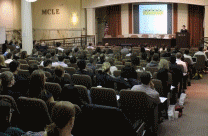What Employers Can & Cannot Do to Discourage Unionization
Dissecting examples of conduct prohibited by the NLRA as well as conduct that is lawful

- Product Number: 2250175P01
-
CLE Credits, earn up to:
1 substantive credits, 0 ethics credits CLE Credit Note - Print Brochure
-
Add to Favorites List
Choose Date/Location:
-
Product Description
Product Description
Navigating the “Dos and Don’ts” of the National Labor Relations Act (NLRA) can be tricky business for employer representatives and labor attorneys. Our panel shares an engaging discussion of examples of conduct that are prohibited by the Act as well as conduct that is lawful. Depending upon the facts and circumstances of each case, experienced practitioners may disagree. In the real world of private sector union organizing, it is not unusual for the union counsel to learn of alleged illegal activity well before the employer and their attorney. Quite often the difference between lawful and unlawful is a single word, or gesture . . . .
Most labor law practitioners are familiar with the basic rules of organizing: no threats, interrogation, promises, solicitation of grievances, or “surveillance.” What about mandatory employee meetings where managers or outside speakers facilitate discussions about the pros and cons of unionization? Can an employee be required to attend such informational meetings against their will? Can an employee be disciplined for refusing to attend, or walking out of the meeting? Are employers allowed to prohibit union buttons, hats and or t-shirts? Is an employer allowed to prohibit employees from passing out pro-union leaflets in the workplace? Our experienced panelists cover all these questions and more during this new lively one-hour program.
-
Agenda
Agenda & Materials
-
12:00 - 12:10 pm
Mandatory Meetings Regarding Unionization
on demand video Add to Cart -
12:10 - 12:15 pm
Statements Regarding Changed Relationship or Communications with Management Post-Unionization
on demand video Add to Cart -
12:15 - 12:20 pm
Unionization: Statements and Changes Concerning Wages and Benefits
on demand video Add to Cart -
12:20 - 12:25 pm
Restrictions on Union-Related Attire or Insignias
on demand video Add to CartTierra A. Jenkins, Esq., Hirsch Roberts Weinstein LLP , Boston
-
12:25 - 12:35 pm
Restrictions on Union or Off-Duty Employee Access to the Employer’s Property
on demand video Add to CartTierra A. Jenkins, Esq., Hirsch Roberts Weinstein LLP , Boston
-
12:35 - 12:40 pm
Unionization: Statements About Bullying or Harassment
on demand video Add to CartGregory A. Robertson, Esq., Pyle Rome Ehrenberg, PC , Boston
Jeffrey L. Hirsch, Esq., Hirsch Roberts Weinstein LLP , Boston
-
12:40 - 12:50 pm
Cemex Bargaining Orders: New Consequences for Violations During Union Election Campaign
on demand video Add to CartGregory A. Robertson, Esq., Pyle Rome Ehrenberg, PC , Boston
-
12:50 - 1:00 pm
"Ask the Experts" Q&A Session and Key Takeaways
Panel
Please Note
MCLE webcasts are delivered completely online, underscoring their convenience and appeal. There are no published print materials. All written materials are available electronically only. They are posted 24 hours prior to the program and can be accessed, downloaded, or printed from your computer.
-
- Faculty

